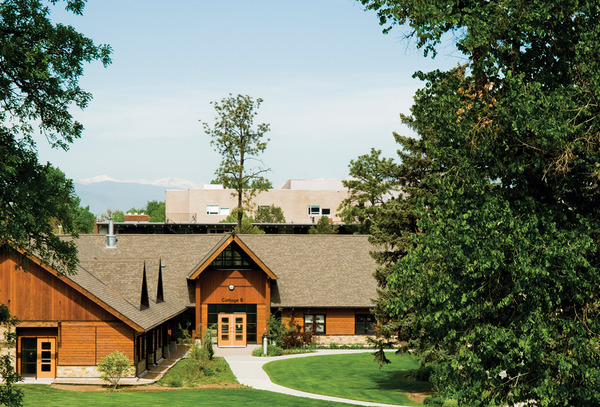The Local newsletter is your free, daily guide to life in Colorado. For locals, by locals.
It takes a village—coaches, physical therapists, nutritionists, trainers, sports psychologists—to keep a professional athlete in the physical (and mental) shape required to perform at an elite level. So it should come as no surprise that when pro athletes need help kicking addictions, they demand equally specialized treatment to shepherd them to recovery. Enter the Center for Dependency, Addiction, and Rehabilitation (CeDAR) on the University of Colorado Anschutz Medical Campus in Aurora.
In November, CeDAR became the nation’s first recovery program specifically for elite athletes: The Ascent Program allows pros to anonymously check themselves in to CeDAR’s seven-acre sanctuary for 30-day inpatient rehabilitation stays without interrupting their normal workout schedules. “When these athletes first walk through our doors, they are tough and hard on the outside and completely broken on the inside,” says Nicholas Edwards, the associate director of program development. The $24,000 Ascent Program helps them heal inside without losing crucial training time by providing all the amenities of a traditional inpatient stay—medical care, psychological testing, counseling, and room and board—along with detailed metabolic analysis, athlete-focused support groups, and sport-specific coaches. The goal is for athletes to recover without missing the intense daily practice vital to compete.
CeDAR’s Edwards says alcohol, steroids, and pain pills are the most common undoings of athletes. Abuse can lead to devastating metabolic and mental changes: The same individuals we’ve seen perform athletic feats of greatness can produce blood test results that resemble a type 2 diabetic when they arrive at CeDAR. This, combined with emotional instability, is a recipe for in-season injuries.

The offseason—when the strict regimen of practice and weight room schedules disappears—is often the worst in terms of abuse, says LaTisha Bader, team leader of the Ascent Program. “The minute the offseason starts and athletes lose accountability, they’ve invited potential for unhealthy behavior,” Bader says. That’s why CeDAR’s Ascent Program follows a rigorous structure: wake-up calls at 6 a.m. followed by scheduled meals, five hours of daily group and individual therapy sessions, and one to three hours of gym and sport-specific training with a team of strength and conditioning coaches. At 11 p.m., it’s lights out.
Since November, 15 athletes have completed the 30-day program and graduated into outpatient treatment plans. According to Harlan Austin, CeDAR’s addiction case manager, athletes who have completed the program say they’ve rediscovered love for their sports—something they thought was lost in their dependencies. “Athletes think they need to just rub some dirt on it and be tough,” Austin says. “It’s contradictory to what’s needed to treat addiction. We teach them to ask for help. It really butts up against the cultural expectations of athletes. They find out they are safe here.”
—Inset image courtesy of Marc Piscotty









